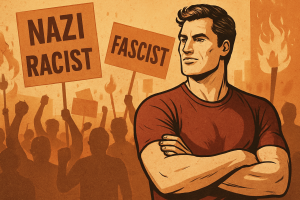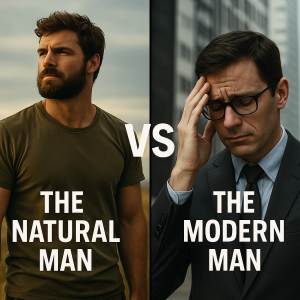A man can have a job, even a good one, and still feel hollow inside. The paycheck may cover the bills, the hours may be steady, yet some deeper part of him gnaws with unease. He does not just want employment—he aches to be useful. That ache is not about wages; it is about worth.
The Difference Between Paid and Valued
Modern economies are efficient at trading time for money. Most men know the drill: clock in, grind out the hours, collect the compensation. But money is only one measure of worth, and it is often the shallowest. To be paid is transactional; to be valued is relational. The difference lies in whether a man’s presence is replaceable or indispensable.
When a company hires you, it is often for your labor. When a family or a community leans on you, it is for your strength, your knowledge, your reliability. The paycheck proves you are useful to a system; the reliance of others proves you are useful to human beings. And at the core of masculinity, being needed by people matters more than being useful to systems.
The Roots of Contribution
Across cultures and centuries, men’s identities have been anchored in what they provide to others. In tribal societies, the hunter who brings food is honored not because he earned points but because he sustained lives. In medieval towns, the blacksmith was not measured by profit margins but by whether the village could survive without his craft. Even in modern families, the father’s role is not remembered for his salary slip but for the security, wisdom, and legacy he leaves.
Work that matters has always been measured in contribution, not compensation. A man’s worth has been bound to his usefulness to those he protects and provides for. Strip away that usefulness, and a man begins to unravel. Studies on unemployment and underemployment show that men suffer not just financial hardship but also profound psychological distress when they feel unneeded. The body can weather poverty; the spirit withers under irrelevance.
The Ache of Redundancy
The modern workplace, with its layers of automation, outsourcing, and bureaucracy, often strips usefulness from labor. Men become cogs in vast machines, their contributions invisible and their replacements always waiting in line. A man may earn, yet he does not feel that he matters.
That is why layoffs wound deeper than lost income. Research has shown that men often equate job loss with personal failure, even when the cause is market forces beyond their control. The blow is not just financial; it is existential. Without a role in which he feels needed, a man questions who he is.
The same ache arises in retirement. Men who have defined themselves by employment find themselves adrift when the job disappears. Money saved may keep them comfortable, but the lack of a place where their usefulness is recognized gnaws at them. Unless they discover new ways to contribute—to mentor, to create, to build—they risk sliding into despair.
Needed Beyond the Paycheck
This ache points to a truth: men are not sustained by employment alone. They require spaces where their presence is essential. A father who fixes the leaky roof, a coach who shapes young men, a neighbor who checks in on the elderly—these roles are not salaried, but they are saturated with worth.
Psychologists studying meaning and purpose have found that men thrive when they feel irreplaceable to someone or something. Contribution becomes the anchor of identity. Being needed transforms life from a cycle of consumption into a narrative of impact. And unlike wages, which can be undercut or outsourced, usefulness in relationships cannot be automated.
The Protector, Provider, and Pioneer
Within the Natural Man framework, usefulness finds three expressions:
- The Protector is useful when others feel safe because of his presence. His usefulness is not measured in dollars but in the calm that follows his vigilance.
- The Provider is useful when he sustains others with resources, knowledge, and stability. He does not just pay bills; he ensures life continues.
- The Pioneer is useful when he pushes boundaries, discovers new ground, and shows the way. His usefulness is measured in the trails he blazes, the risks he takes for the benefit of others.
Each role points to the truth that usefulness is always outward-facing. It is not about self-gratification but about contribution to the circle around him. The ache to be useful is not weakness; it is a signal. It reveals that men are designed to be more than economic units. They are meant to be relied upon.
The Reward of Being Needed
At the deepest level, what men desire is not applause but reliance. To hear, “We could not have done this without you.” To know that when he steps into the room, things change. To carry weight that, if dropped, would matter.
A paycheck can buy food, but only being needed can nourish the soul. Compensation keeps a man alive; contribution keeps him human.
And so the ache to be useful is not something to medicate or dismiss. It is the compass pointing men back to what they were made for: to protect, to provide, to pioneer, and in doing so, to matter.
References
- Jahoda, M. (1982). Employment and Unemployment: A Social-Psychological Analysis. Cambridge University Press.
- Paul, K. I., & Moser, K. (2009). Unemployment impairs mental health: Meta-analyses. Journal of Vocational Behavior, 74(3), 264–282.
- Ryff, C. D., & Singer, B. (1998). The contours of positive human health. Psychological Inquiry, 9(1), 1–28.
- Frankl, V. E. (1985). Man’s Search for Meaning. Washington Square Press.
- Killewald, A. (2016). Money, work, and marital stability: Assessing change in the gendered determinants of divorce. American Sociological Review, 81(4), 696–719.





